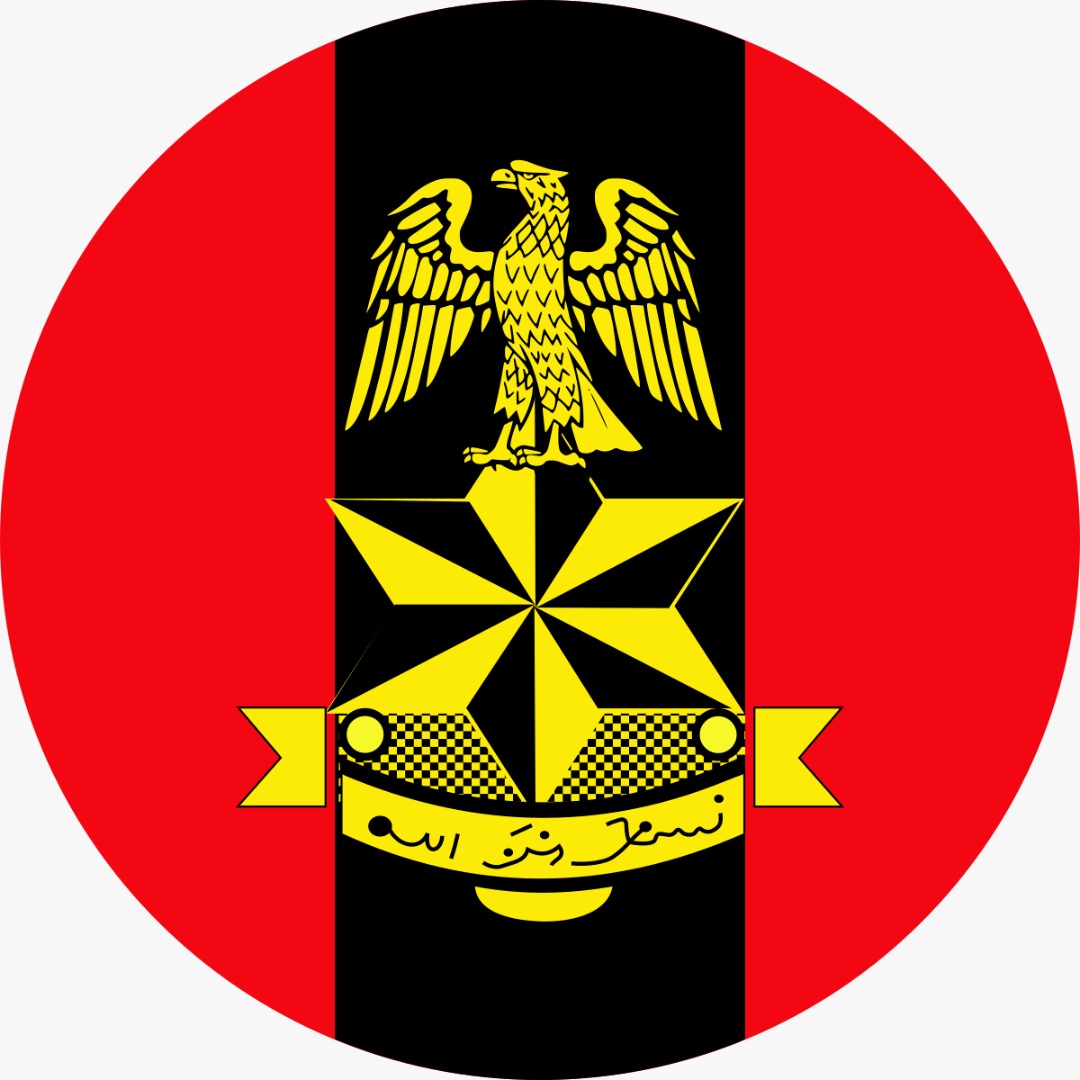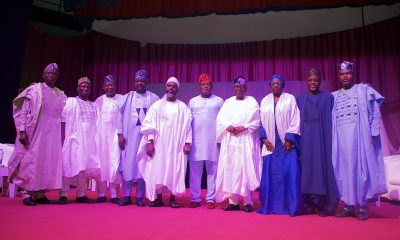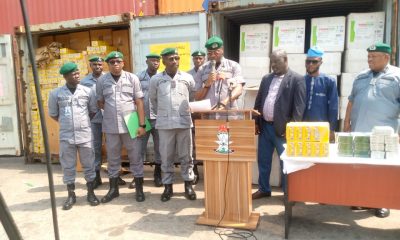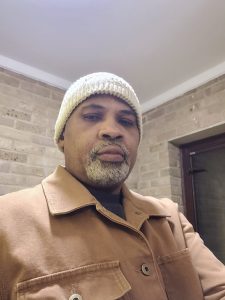SECURITY
Shameless soldiers of the Nigerian Army By Tunde Odesola

Shameless soldiers of the Nigerian Army By Tunde Odesola
Nigerian Army– They depict horror and terror when they should be heroes and she-roes. They represent the flickering cowardice in the darkling plain of repression when they should glitter like gold in the courageous sun. They are the Nigerian military: the monsters of sorrow, tears and blood; the devils and demons of death.

Amputated by unpatriotism, and gaunt on nationalism – the Nigerian Army – is the harbinger of anguish and despair to a nation writhing in the inferno of greed, beastiality, prodigality and incompetence, since it struck on January 15, 1966 and was vanquished on May 29, 1999.
Lest I be drowned in the sycophantic cacophony of ‘US-is-more-advanced-than-Nigeria’ rejoinders, I’ll cite Ghana, our dear neighbour, as an example of a sexagenarian country like Nigeria, that had been ruled by soldiers, but which has long left Nigeria in self-destruct dungeon.
In terms of military coups and democratic change of power, Ghana is superior to Nigeria, though Nigeria embarked on the journey of coup-plotting 40 days earlier than Ghana.
I won’t compare the US military with Nigeria’s, to do so is to compare the Atlantic ocean with a teardrop. Instructively, of the 45 presidents of the United States, 31 of them served in the military with about a dozen of them being war heroes.
In the main, American soldiers, who served as presidents, and others veterans, who held various political offices, burnished with patriotic fervour.
With their inexplicable wealth, greed was the starch of corruption on the crispy khaki of many rogue generals that held various leadership positions during Nigeria’s military misadventures that came in the form of coups.
Hiding behind the mask of ‘non-negotiable national unity’, 99.9% of the leaders of the Nigerian military, at various times in the nation’s catastrophic history, made personal fortunes in the confusion they caused by substituting nationalism, competence and chivalry with ethnicity, nepotism and repressive Constitutions.
The third President of the United States, Thomas Jefferson, was a soldier and war hero, who authored the evergreen Declaration of Independence in 1776. He served two terms and lived for 83 years – between 1743 and 1826.
Quite unlike the haughty soldiers of fortune that stomp and kick up dust in Nigeria, Jefferson was a statesman, diplomat, lawyer, architect, musician, philosopher, writer, politician and patriot.
Having repeatedly seen despotic boots brutalising the bloodied butts of democracy and freedom, Jefferson sounded a warning, more than a 100 years before Nigeria was created, saying, “Until we stop harming all other living beings, we are still savages.”
But Nigerian soldiers will never listen. A female member of Nigeria’s clan of savage soldiers, Lt. Chika Anele, two weeks ago, dehumanised an innocent female member of the National Youth Service Corps, Ifenyinwa Ezeiruaku, at the 13 Brigade Headquarters, Calabar, Cross River State, by beating her up, pouring dirty water on her, subjecting her to bodily injuries and gruesome corporal punishments.
Following the outrage that greeted the viral video of Anele’s insane act, the Nigerian military mounted the podium to deny the allegations of cover-up, saying in the quivering voice of Falz the Bad Guy, that ‘the officer involved has been identified and sanctioned in the interim…’
Nearly 20 days after the evil incident, the military, in their arrogant and wanton manner, have said nothing about the show of shame, in the belief that Nigerians, as usual, have pulled up the carpet and swept the incident under.
To the generality of the Nigerian Army, many of whom are grossly uncivilised, Nigerians aren’t better than monkeys to be shot for sport.
No doubt, Anele needs an urgent psychiatric evaluation to determine her mental fitness for the soldiering job, which makes sacrifice the peak of patriotism, just as Ezeiruaku needs comprehensive psychological counselling to overcome the traumatic abuse.
It is ridiculous that Anele picked on Ezeiruaku because she shook a Nigerian soldier, whose feeding, clothing, accommodation and welfare are catered for by the taxes Ezeiruaku and other Nigerians pay to the Federal Government.
I would’ve recommended massive reorientation of the beasts in the Nigerian Army, but it won’t work because dehumanisation of the civilian populace appears to be one of the drills soldiers are made to undergo while in training.
If it were not so, Nigeria’s military hierarchy should have announced forthwith the dismissal of Anele, a termagant unworthy of the noble calling of a soldier.
It’s so laughable that the military uniform for which Nigerian soldiers beat and kill civilians are worn by anyone in the US. You can walk into any store and purchase any colour of military camouflage or military uniform of your choice to wear.
Despite the attempt to give the US military a human face, and make soldiers live in amity within civilians, the US government and the American people still accord the highest respect to soldiers ahead of all other professions.
I’m not saying that Nigeria should quash Section 109 of the Criminal Code which forbids civilians from wearing military uniforms except if granted the permission to do so by the President or the governor, or if it is for stage play, all I’m saying is Nigerians should not be brutalised for an offence whose fine is just N10.
In its predictable viciousness, the Army was reported in March 2021 to have dismissed and detained one Emmanuel Odaudu in an underground cell for more than eight months because he rapped in his military uniform while he was still in the Army.
The victim’s mother, simply identified as Helen, said her son was arrested, blindfolded, chained in both hands and legs, and taken away.
Helen said her son was arrested in Otukpo, Benue State, and detained in underground cells in Port Harcourt and Abuja because Army authorities saw a shared Facebook memory of her son rapping in military uniform.
Personally, I’ve seen Nigerians being stripped naked and battered by soldiers on the streets of Lagos for wearing clothes with army-green colour, driving vehicles with army-green colour or wearing green colour berets.
A fatal fate befell a 43-year-old man, Ajayi Oladele, who was tortured to death by soldiers of the Nigerian Navy, 4 Mechanised Brigade, Benin, Edo State, sometime ago.
The breadwinner of his family, Oladele was chained to the bed of Military Hospital, Benin, where he was rushed to when his health deteriorated after being tortured.
Oladele’s killers in Nigerian Army uniforms detained and killed him over an allegation that he owed a friend, Kayode Adeosho, N1.5m, a claim which Oladele’s family described as untrue.
As it is the case of so many Nigerians, who have been killed or suffered extreme torture by soldiers, Nigerian military authorities have always kept mute and shielded erring soldiers who leave their duty posts to engage in criminal activities.
The case of notorious kidnapper, Bala Hamisu aka Wadume, comes to mind. Even after Wadume had implicated 10 soldiers and nine civilians as his accomplices in the killing of three policemen and two civilians at a checkpoint along the Takum-Ibbi Road, Taraba State, in 2019, the Attorney General of the Federation, Abubakar Malami, had withdrawn the charges against the soldiers and set the killers free.
No country needs a cowardly Army that poops in the pants at the mention of Boko, but turns its guns on innocent citizens. The late comedian, Moses Olaiya aka Baba Sala, had a song for big-for-nothing bullies, “A se ko le ja, tito lo tobi banku, banku!”
Costa Rica, Iceland, Mauritius, Monaco, Panama and Vanuatu are examples of countries with limited military forces but no standing armies. All these countries are safer than Nigeria.
Andorra, Dominica, Grenada, Kiribati, Liechtenstein, Samoa, Solomon Islands, Marshall Islands, Saint Lucia, Saint Vincent and the Grenadines, Federated States of Micronesia, Nauru, and Palau are examples of countries WITHOUT military forces. People don’t die like cockroaches in these countries as they do in Nigeria.
Nigeria can do without killers in army uniform, please.
Email: [email protected]
Facebook: @tunde odesola
Twitter: @tunde_odesola
TundeOdesola.com
punchng.com
SECURITY
COMPTROLLER KOLA OLADEJI: THE TRAILBLAZING CUSTOMS CHIEF WHO TRANSFORMED BORDER SECURITY AND REVENUE GENERATION AT FOU ZONE A

COMPTROLLER KOLA OLADEJI: THE TRAILBLAZING CUSTOMS CHIEF WHO TRANSFORMED BORDER SECURITY AND REVENUE GENERATION AT FOU ZONE A
Sahara Weekly Unveils That In the often chaotic landscape of Nigeria’s border security and revenue collection, one individual has emerged as a transformative leader: Comptroller Kola Oladeji, the immediate past Comptroller of the Federal Operations Unit (FOU) Zone A. Over the course of his 12-month tenure, Oladeji has not only revolutionized Customs operations within that region but has also set a new standard for effective, compassionate, and intelligent border protection in 21st-century Africa. His strategic interventions and leadership approach have created a model that may pose a significant challenge for his successor to fill the substantial gaps left by his redeployment.
Comptroller Oladeji attributes his remarkable achievements to the unwavering support and guidance he received from the current Comptroller General of Customs, CGC Bashir Adewale Adeniyi, as well as the collaboration from all members of the Management of the Service. This backing not only facilitated smoother operations but also empowered him to fulfill his mandate with remarkable efficiency. Under his leadership, the FOU Zone A experienced enhanced operational effectiveness, improved revenue collection, and strengthened border security measures, paving the way for a more organized and secure customs process that benefits both the government and the citizens.
The data available presents a compelling narrative of success; however, it is important to note that as of Wednesday, April 23, there was a noticeable absence of FOU Zone A operatives on the roads of Lagos. Despite this lack of visible presence, the FOU ‘A’, led by the former Comptroller Oladeji, continued to fulfill its primary mission effectively. In recent operations, the unit conducted significant seizures, including a cache of arms and ammunition in Oshodi, Lagos, all based on reliable intelligence. Remarkably, these operations were carried out without seeking media attention, underscoring the commitment of the team to their duties and the delicate nature of their work. Such efforts highlight the ongoing commitment to maintaining security and public safety, even amidst challenges in visibility and outreach.
The impressive performance he has displayed is a direct extension of the outstanding work he accomplished while serving as the Coordinator of the Joint Border Patrol Team for the North West Zone – Sector 2. During his tenure in this role, he not only demonstrated strong leadership and strategic planning but also fostered collaboration among various agencies to enhance border security. His successful initiatives and commitment to excellence in this position ultimately paved the way for his transition to the Federal Operations Unit (FOU) Zone A, where he continues to build on his accomplishments and drive positive results.
When Oladeji took the helm at the Federal Operations Unit (FOU) Zone A, few could have anticipated the remarkable turnaround that would follow. Under his leadership, Zone A exceeded its 2024 revenue target by an astonishing 57.6%, transforming it into Nigeria’s premier revenue-generating unit within the Customs Service. Faced with the challenge of operating without direct control over any major ports, Oladeji and his dedicated team set an ambitious approved revenue target of ₦569 million. Through strategic initiatives, heightened enforcement, and intensified anti-smuggling operations, they achieved a staggering revenue collection of ₦896 million. This achievement not only underscores Oladeji’s exceptional leadership skills but also reflects his ability to innovate and maximize resources in a challenging environment.
But Oladeji’s impact wasn’t just about the figures. It was about a total overhaul, changing the way things were done, shattering off mediocrity. The days of violent clashes with smugglers are behind us. In their place is “Operation Swift Sting” – a smart, intelligence-driven strategy that blends the latest surveillance tech with good old-fashioned detective work. The outcomes have been nothing short of amazing: ₦18 billion worth of contraband seized, including 10,000 donkey skins valued at ₦8 billion that were just moments away from being illegally exported.
One of the most telling seizures was the interception of 11,870 cutlasses, which sent shockwaves through criminal networks in the Southwest. This wasn’t just a Customs operation; it was a proactive move to prevent potential violence. Other seizures read like a list of threats to national security: 50,000 bags of foreign rice that could harm local farmers, 191,000 liters of diverted PMS, 7,861kg of cannabis, and 37,630 doses of Tramadol – each interception a significant step against the forces undermining Nigeria’s stability.
What set Oladeji’s approach apart wasn’t just what he seized, but how he did it. His philosophy was refreshingly straightforward: “We don’t chase smugglers – we outsmart them.” This mindset led to a revenue surge in July 2024, reaching ₦133 million, a 245% increase from the previous year, achieved not through brute force but through careful document checks and demand notices. It proved that brains are far more effective than brawn in customs operations.
The House of Representatives Committee on Customs witnessed this transformation firsthand during their oversight visit. Committee Chairman Leke Abejide didn’t hold back: “What we’ve seen here redefines Customs excellence.” In an organization often linked with controversy, Oladeji built something truly remarkable – a high-performance operation that resists corruption while balancing strict enforcement with community engagement.
As Nigeria faces an economic crossroads, the Oladeji model offers more than just success stories; it provides a roadmap. A roadmap for how technology can outsmart smuggling networks. A roadmap showing that revenue generation and humane enforcement can go hand in hand. And, most importantly, a roadmap highlighting how visionary leadership can turn even the toughest government institutions around.
With the Fourth Mainland Bridge and Lekki Deep Sea Port set to open soon, Oladeji’s strategic position allows him to achieve even greater results. If he’s accomplished this much in just 15 months, imagine the possibilities if his innovative approach were applied nationwide. In a time that craves transformative leadership, Kola Oladeji has not only raised the bar for customs operations – he’s demonstrated what’s achievable when skill, creativity, and courage come together in Nigeria’s public service.
The takeaway is clear: Nigeria’s fight for economic security doesn’t need more weapons – it needs more leaders like Oladeji. Leaders who recognize that true security comes not from guns, but from the smart use of law, technology, and, above all, principled leadership. A remarkable feat of Comptroller Oladeji ‘s tenure was the huge quantum of seizures recorded without firing a single shot at any Nigerian, nor recording a Protest of Nigerians. As his reforms gain national attention, one truth stands out: this is what happens when Nigeria’s brightest minds are given the chance to serve.
Business
Elon Musk’s Team Accuses FEMA of Misusing $59 Million to House Illegal Migrants in Luxury Hotels

Elon Musk’s Team Accuses FEMA of Misusing $59 Million to House Illegal Migrants in Luxury Hotels
Elon Musk’s Department of Government Efficiency (DOGE) has made serious allegations against the Federal Emergency Management Agency (FEMA), claiming that the agency misused $59 million to accommodate illegal migrants in luxurious hotels.
The billionaire entrepreneur revealed this in a tweet on Monday morning, stating that the discovery was made last week. According to Musk, the funds were intended for American disaster relief but were instead diverted in violation of national regulations.
He wrote: “The @DOGE team just discovered that FEMA sent $59M LAST WEEK to luxury hotels in New York City to house illegal migrants. Sending this money violated the law and is in gross insubordination to the President’s executive order. That money is meant for American disaster relief and instead is being spent on high-end hotels for illegals! A clawback demand will be made today to recoup those funds.”
The revelation has sparked controversy, with critics arguing that FEMA’s allocation of funds should prioritize American citizens affected by disasters. The allegations have also intensified scrutiny on FEMA, which has faced previous accusations of financial mismanagement.
An inspector general audit recently revealed that FEMA mishandled nearly $10 billion in COVID-19 relief funds. The audit stated that $8.1 billion in costs remained questionable, while $1.5 billion was allocated prematurely and could have been better utilized for other emergencies.
As scrutiny mounts, former President Donald Trump has reportedly considered abolishing FEMA, describing the agency as “a disaster.” To address these concerns, Trump has established a council, led by Homeland Security Secretary Kristi Noem and Defense Secretary Pete Hegseth, to review FEMA’s operations and propose necessary reforms by late June.
The allegations against FEMA have triggered a broader debate on the proper allocation of taxpayer funds and the government’s role in disaster management. More updates are expected as the situation develops.
Business
Shepherd freight Cargo services Now in Lagos and Ibadan Nigeria

Shepherd freight Cargo services Now in Lagos and Ibadan Nigeria.
-

 celebrity radar - gossips6 months ago
celebrity radar - gossips6 months agoWhy Babangida’s Hilltop Home Became Nigeria’s Political “Mecca”
-

 society6 months ago
society6 months agoPower is a Loan, Not a Possession: The Sacred Duty of Planting People
-

 society5 months ago
society5 months agoReligion: Africa’s Oldest Weapon of Enslavement and the Forgotten Truth
-

 news6 months ago
news6 months agoTHE APPOINTMENT OF WASIU AYINDE BY THE FEDERAL GOVERNMENT AS AN AMBASSADOR SOUNDS EMBARRASSING












